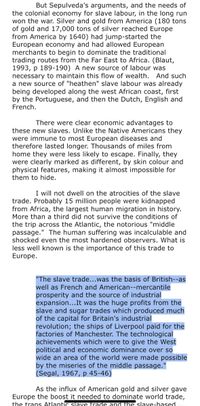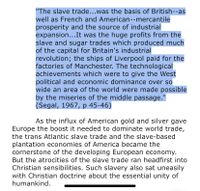Question
What was the new economic role of slavery in America?

Transcribed Image Text:But Sepulveda's arguments, and the needs of
the colonial economy for slave labour, in the long run
won the war. Silver and gold from America (180 tons
of gold and 17,000 tons of silver reached Europe
from America by 1640) had jump-started the
European economy and had allowed European
merchants to begin to dominate the traditional
trading routes from the Far East to Africa. (Blaut,
1993, p 189-190) A new source of labour was
necessary to maintain this flow of wealth. And such
a new source of "heathen" slave labour was already
being developed along the west African coast, first
by the Portuguese, and then the Dutch, English and
French.
There were clear economic advantages to
these new slaves. Unlike the Native Americans they
were immune to most European diseases and
therefore lasted longer. Thousands of miles from
home they were less likely to escape. Finally, they
were clearly marked as different, by skin colour and
physical features, making it almost impossible for
them to hide.
I will not dwell on the atrocities of the slave
trade. Probably 15 million people were kidnapped
from Africa, the largest human migration in history.
More than a third did not survive the conditions of
the trip across the Atlantic, the notorious "middle
passage." The human suffering was incalculable and
shocked even the most hardened observers. What is
less well known is the importance of this trade to
Europe.
"The slave trade...was the basis of British--as
well as French and American--mercantile
prosperity and the source of industrial
expansion...It was the huge profits from the
slave and sugar trades which produced much
of the capital for Britain's industrial
revolution; the ships of Liverpool paid for the
factories of Manchester. The technological
achievements which were to give the West
political and economic dominance over so
wide an area of the world were made possible
by the miseries of the middle passage."
(Segal, 1967, p 45-46)
As the influx of American gold and silver gave
Europe the boost it needed to dominate world trade,
the trans Atlantic slave frade anGuhe slave-based

Transcribed Image Text:"The slave trade...was the basis of British--as
well as French and American--mercantile
prosperity and the source of industrial
expansion...It was the huge profits from the
slave and sugar trades which produced much
of the capital for Britain's industrial
revolution; the ships of Liverpool paid for the
factories of Manchester. The technological
achievements which were to give the West
political and economic dominance over so
wide an area of the world were made possible
by the miseries of the middle passage."
(Segal, 1967, p 45-46)
As the influx of American gold and silver gave
Europe the boost it needed to dominate world trade,
the trans Atlantic slave trade and the slave-based
plantation economies of America became the
cornerstone of the developing European economy.
But the atrocities of the slave trade ran headfirst into
Christian sensibilities. Such slavery also sat uneasily
with Christian doctrine about the essential unity of
humankind.
Expert Solution
This question has been solved!
Explore an expertly crafted, step-by-step solution for a thorough understanding of key concepts.
Step by stepSolved in 4 steps
